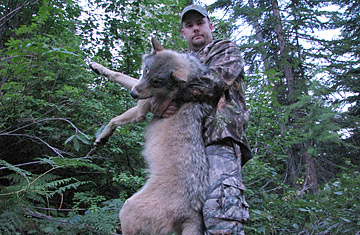
Robert Millage, 34, with a wolf he caught on the first day of hunting season in 2009 in Idaho
(2 of 2)
Government watchdogs, meanwhile, worry that taking away forms of oversight, even when there isn't a pressing need for it, sets a dangerous precedent. "We're taking another piece [of information] in order to stroke and soothe one small segment of society," says Charles Davis, executive director for the National Freedom of Information Coalition. "And if you do that over and over again, guess what's going to happen to public information at the end of the day? There's not going to be any."
The conflict in Idaho escalated in January, when Rick Hobson, a local activist, made a public-records request for the names of hunters who had killed wolves during the season, then posted all 122 on a website and took out an ad in the Idaho Statesman directing people to the list. "There's a small local group of hunters who feel that they and only they have a right to decide what happens to wildlife on state and federal land," he says. "I posted the list to remind them that it's a public process, that hunting is not a right, it's a privilege."
That posting brought Hobson his own barrage of hate mail and threats, in part because the list included the name of a 12-year-old boy. Boyle says Hobson's use of the information "played right into the reasoning" for making the records exempt while members debated the bill.
Other states are trying to protect hunters from different forms of harassment. A Virginia bill aimed at keeping activists from strategically (and sometimes dangerously) using food to interfere with waterfowl hunting is set to become law on April 13. In that state, it's illegal to lure birds with bait, and there have been reports of activists littering hunting spots with food — sometimes from boats in front of shooters' blinds — so that any birds that showed up would be off-limits. The measure, proposed by state delegate Scott Lingamfelter, was passed unanimously by both houses.
In Wisconsin, where reports of hunter harassment more than tripled during last year's deer season, territorial landowners have clashed repeatedly with hunters, and hunters have clashed among themselves. Such reports are especially alarming in a state where there have been two fatal hunter shootings, leaving seven dead, within the past decade, says chief conservation warden Randy Stark. The increased number of reports is still minuscule in Wisconsin — there were only 15 harassment cases among 600,000 hunters — but each is treated as a potential tragedy. "Although there's few of them, it only takes one for there to be a bad outcome," says Stark. "No good can come from an emotional conflict between two armed people."
The fear of hunter-harassment clashes turning deadly is often what gains them attention, despite how rare they are among the millions of hunters who go out into the field each year. In Idaho's case, that fear has been compounded by years of tension over wolf reintroduction, as the unpopular animals were placed in Idaho by the federal government against the state's will, and by uncertainty about what it could mean to start shrouding hunters in anonymity. "Licensure has always been public, with good reason," Davis says. "Because it's a privilege you're asking the state for, and privileges can be used for all sorts of nefarious purposes."
